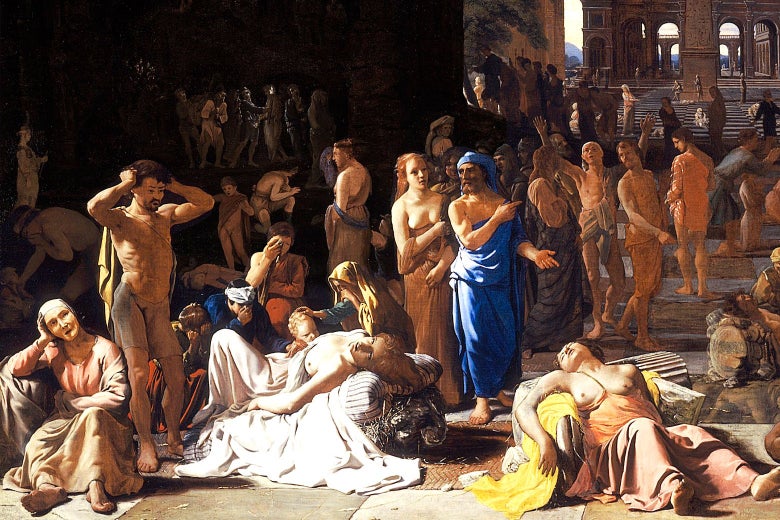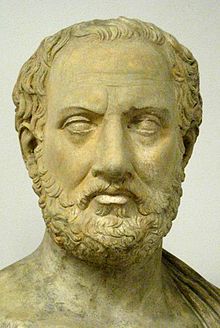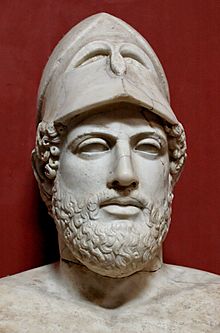
Plagues have often made their appearance throughout the history of Man, killing thousands of people and changing the course of history. One such plague was the Great Plague of Athens in 430 BC (Greek: Λοιμός των Αθηνών), a plague that claimed between 70,000 – 100,000 Athenian lives, approximately a third of the population.
The plague began in Athens in the second year of the Peloponnesian War, which began in 431 BC and ended in 404 BC. The cause of the war was due to the growing Athenian power and its control of the Delian League, the vast naval alliance that allowed it to dominate the Mediterranean Sea. Sparta and her allies felt threatened by this and therefore invaded Attica under the command of Archidamus, son of Zeuxidamus, king of Sparta.
 Thucydides (Greek: Θουκυδίδης 460-400 BC), an Athenian aristocrat, general and historian was able to record the tragedy of the plague and the hardship it caused the Athenians in his book, The History of the Peloponnesian War. It is said that the plague came from Ethiopia, spread into Egypt and Libya and continued into the areas of Greece as far away as the island of Lemnos in the north Aegean. Therefore, soon after the Peloponnesian army invaded Attica and forced the people of the surrounding areas to crowd into Athens for protection, the plague broke out there as well. It began in Piraeus the city’s port and the entry of food and supplies. Athenians remembered an old saying, “A Dorian [Spartan] war will come, and bring a pestilence with it.” The plague initially lasted for two years (430-428 BC) and another wave started again in the winter of 427-426 BC.
Thucydides (Greek: Θουκυδίδης 460-400 BC), an Athenian aristocrat, general and historian was able to record the tragedy of the plague and the hardship it caused the Athenians in his book, The History of the Peloponnesian War. It is said that the plague came from Ethiopia, spread into Egypt and Libya and continued into the areas of Greece as far away as the island of Lemnos in the north Aegean. Therefore, soon after the Peloponnesian army invaded Attica and forced the people of the surrounding areas to crowd into Athens for protection, the plague broke out there as well. It began in Piraeus the city’s port and the entry of food and supplies. Athenians remembered an old saying, “A Dorian [Spartan] war will come, and bring a pestilence with it.” The plague initially lasted for two years (430-428 BC) and another wave started again in the winter of 427-426 BC.
Thucydides was in command of 7 ships stationed at the island of Thasos. He was blamed for the capture of Amphipolis by the Spartans and her allies in 424-423 BC during the Peloponnesian War as he failed to arrive in time to help due to the lack of a strong sea breeze. He was recalled to Athens, tried and exiled for twenty years. He also contracted the disease, but survived and was able to describe the illness and the effect it had on the lives of the people. He looks at the practical and moral weaknesses that the plague brought to the surface as well as the way death and suffering tested individuals and society.
“It was also my fate to be an exile from my country for twenty years after my command at Amphipolis; and being present with both parties, and more especially with the Peloponnesians by reason of my exile, I had leisure to observe affairs somewhat particularly”.
There was no explanation for this illness. People in good health suddenly took ill. The symptoms included extreme headache; red, inflamed eyes; throats and tongues bleeding; unsavory breath; sneezing; hoarseness; chest pain and cough; upset stomach and vomiting; reddening skin with welts; insatiable thirst; dysentery and finally death within 7-9 days.
Thucydides gives us a detailed account of the plague and the hardship it caused the Athenians.
“Externally the body was not very hot to the touch, nor pale in its appearance, but reddish, livid, and breaking out into small pustules and ulcers. But internally it burned so that the patient could not bear to have on him clothing or linen even of the very lightest description; or indeed to be otherwise than stark naked. What they would have liked best would have been to throw themselves into cold water; as indeed was done by some of the neglected sick, who plunged into the rain tanks in their agonies of unquenchable thirst; though it made no difference whether they drank little or much.
Though many lay unburied, birds and beasts would not touch them, or died after tasting them”.

All the burial rites in use before no longer applied and they buried the bodies as best they could in mass graves. The behavior of the people changed so that neither fear of the gods or law could retain them. The plague even killed the Athenian general and statesman Pericles, his wife and their sons Paralus and Xanthippus in 429 BC. Pericles was responsible for beautifying Athens and making it the educational and cultural centre of the ancient Greek world with his ambitious project of building such as the surviving structures on the Acropolis, including the Parthenon.
It can be said that the Great Plague turned the tied against the Athenians and led to their defeat after 27 years of war. The aftermath of the war not only shaped the peace that followed, but also weakened and then destroyed the Athenian democracy. A pro-Spartan oligarchy known as the Thirty Tyrants took control of the city. Although a coup led by Thrasybulus, a veteran of the Peloponnesian War and a pro-democrat, overthrew the Tyrants, the Athenian democracy never recovered its self-confidence. The people and the country were never the same again.